Related Research Articles
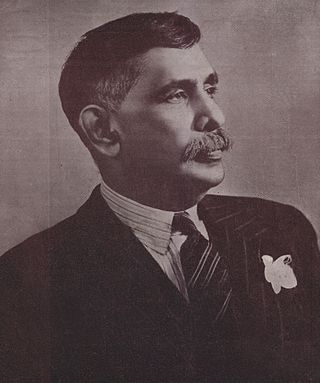
Don Stephen Senanayake was a Ceylonese statesman. He was the first Prime Minister of Ceylon having emerged as the leader of the Sri Lankan independence movement that led to the establishment of self-rule in Ceylon. He is considered as the "Father of the Nation".

The Sri Lanka Broadcasting Corporation (SLBC) (Sinhala: ශ්රී ලංකා ගුවන් විදුලි සංස්ථාව, Shrī Lankā Guvan Viduli Sansthāva, Tamil: இலங்கை ஒலிபரப்புக் கூட்டுத்தாபனம், Ilangkai Oliparappuk Kūṭṭuttāpaṉam) came into existence on 5 January 1967 when Radio Ceylon became a public corporation. Dudley Senanayake who was the Prime Minister of Ceylon in 1967 ceremonially opened the newly established Ceylon Broadcasting Corporation along with Minister Ranasinghe Premadasa and the Director-General of the CBC, Neville Jayaweera. The first board of Directors of CBC consisted of Mr Neville Jayaweera (CCS), Mr A. L. M. Hashim, Mr Dharmasiri Kuruppu, Mr K.A.G. Perera and Mr Devar Surya Sena. After the first board meeting, it was decided unanimously to appoint the chairman, Mr Jayaweera, as the new Director-General.

Alfred Thangarajah Duraiappah was a Sri Lankan lawyer who served as Mayor of Jaffna from 1970 until his assassination. He was also a Member of Parliament for Jaffna from 1960 to 1965. Duraiappah was killed by the Liberation Tigers of Tamil Eelam.

Ganapathipillai Gangaser Ponnambalam was a Ceylon Tamil lawyer, politician and cabinet minister. He was the founder and leader of the All Ceylon Tamil Congress (ACTC), the first political party to represent the Ceylon Tamils.
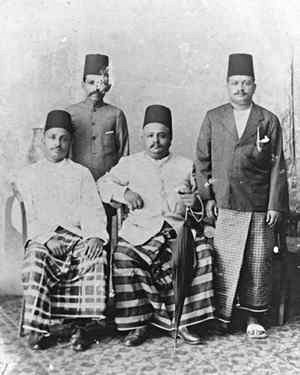
Sri Lankan Moors are an ethnic minority group in Sri Lanka, comprising 9.3% of the country's total population. Most of them are native speakers of the Tamil language. The majority of Moors who are not native to the North and East also speak Sinhalese as a second language. They are predominantly followers of Islam. The Sri Lankan Muslim community is mostly divided between Sri Lankan Moors, Indian Moors, Sri Lankan Malays and Sri Lankan Bohras. These groups are differentiated by lineage, language, history, culture and traditions.
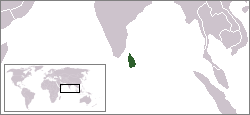
The 1958 anti-Tamil pogrom and riots in Ceylon, also known as the 58 riots, refer to the first island-wide ethnic riots and pogrom to target the minority Tamils in the Dominion of Ceylon after it became an independent dominion from Britain in 1948. The riots lasted from 22 May until 29 May 1958 although sporadic disturbances happened even after the declaration of emergency on 27 May 1958. The estimates of the murders range, based on recovered bodies, from 158 to 1,500. Although most of the victims were Tamils, Sinhalese and their property were also affected by retaliatory attacks by Tamil mobs throughout the Batticaloa and Jaffna districts. As the first full-scale race riot in the country in over forty years, the events of 1958 shattered the trust the communities had in one another and led to further polarisation.

Samuel James Veluppillai Chelvanayakam was a Ceylonese lawyer, politician and Member of Parliament. He was the founder and leader of the Illankai Tamil Arasu Kachchi (ITAK) and Tamil United Liberation Front (TULF) and a political leader of the Ceylon Tamil community for more than two decades. Chelvanayakam has been described as a father figure to Ceylon's Tamils, to whom he was known as "Thanthai Chelva".
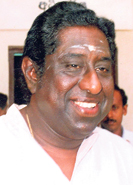
Gaasinather Gangaser Ponnambalam was a Sri Lankan lawyer and politician. Leader of the All Ceylon Tamil Congress, he was the party's presidential candidate in 1982. He was shot dead on 5 January 2000 in an assassination many suspect to be ordered by President Chandrika Kumaratunga.

British Ceylon, officially British Settlements and Territories in the Island of Ceylon with its Dependencies from 1802 to 1833, then the Island of Ceylon and its Territories and Dependencies from 1833 to 1931 and finally the Island of Ceylon and its Dependencies from 1931 to 1948, was the British Crown colony of present-day Sri Lanka between 1796 and 4 February 1948. Initially, the area it covered did not include the Kingdom of Kandy, which was a protectorate, but from 1817 to 1948 the British possessions included the whole island of Ceylon, now the nation of Sri Lanka.
Sri Lankan Tamil nationalism is the conviction of the Sri Lankan Tamil people, a minority ethnic group in the South Asian island country of Sri Lanka, that they have the right to constitute an independent or autonomous political community. This idea has not always existed. Sri Lankan Tamil national awareness began during the era of British rule during the nineteenth century, as Tamil Hindu revivalists tried to counter Protestant missionary activity. The revivalists, led by Arumuga Navalar, used literacy as a tool to spread Hinduism and its principles.

Wijayatunga Mudalige Harischandra Wijayatunga is a Sri Lankan author, translator, lexicographer, teacher, lawyer and politician. He held various offices in different institutions of the Government of Sri Lanka. At present he is the leader of Sinhalaye Mahasammatha Bhoomiputra Party. During the presidential elections of 1994 and 1999, he was the candidate of that party for this high office.
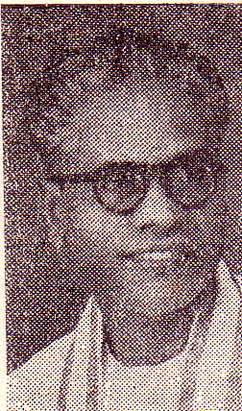
Kaarthigesar Ponnambalam Ratnam was a Sri Lankan Tamil academic, politician and Member of Parliament.

Royal College, Colombo also known as; Royal Colombo, Colombo Royal College or Colombo Royal) is a selective entry boys' school located in Cinnamon Gardens, Colombo, Sri Lanka. Started by Joseph Marsh in 1835, it was established as the Colombo Academy by Sir Robert Wilmot-Horton in January 1836, as part of the implementation of the recommendations of the Colebrooke Cameron Commission (1833), and was the first government-run secondary school for boys in the island.
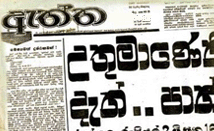
Aththa was a Sinhala-language daily newspaper, published from Colombo by the Communist Party of Sri Lanka between 1964 and 1995. The name was borrowed from the Russian newspaper Pravda. As of 1971, it had an edition of around 41,000. It had a special Sunday edition. As of the early 1970s, B.A. Siriwardena served as editor-in-chief of the newspaper, Newton Seneviratne as its news editor and Surath Ambalangoda as its features editor. As of the mid-1980s, H.G.S. Ratnaweera was the editor-in-chief of Aththa.
Vicumpriya Perera is a Sri Lankan born mathematician, lyricist, poet and music producer. He has published three books of Sinhala poetry, Mekunu Satahan in 2001, Paa Satahan in 2013, and Mawbime Suwandha in 2023. He has written over 200 songs and has produced eleven Sinhala song albums. He currently works as a mathematics professor in Ohio, US.
The Ceylon National Congress (CNC) was a political party in colonial-era Ceylon founded on 11 December 1919. It was founded during a period where nationalism and support for the Sri Lankan independence movement grew quite intensely amidst British colonial rule in Ceylon. It was formed by members of the Ceylon National Association and the Ceylon Reform League.
Chinthamani was a Tamil language weekly newspaper in Ceylon published by Independent Newspapers Limited, part of M. D. Gunasena & Company. It was founded on 1966 and was published from Colombo. In 1966 it had an average net sales of 19,000. It had an average circulation of 35,000 in 1973.
Dinapathi was a Tamil language daily newspaper in Ceylon published by Independent Newspapers Limited, part of M. D. Gunasena & Company. It was founded on 1964 and was published from Colombo. In 1966 it had an average net sales of 11,000. It had an average circulation of 12,100 in 1970 and 31,337 in 1973.
Sundari was a Tamil language weekly newspaper in Sri Lanka published by Independent Newspapers Limited, part of M. D. Gunasena & Company. It was founded on 1973 and was published from Colombo. It had an average circulation of 1,000 in 1973.
Thanthi was a Tamil language daily evening newspaper in Ceylon published by Independent Newspapers Limited, part of M. D. Gunasena & Company. It was founded on 1967 and was published from Colombo. In 1967 it had an average net sales of 16,000. It had an average circulation of 10,020 in 1973.